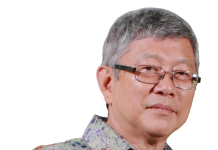 Kuala Lumpur, April 15 – The Federation of Reproductive Health Associations, Malaysia (FRHAM) organized a roundtable in partnership with the Malaysian Council of Child Welfare (MKKM) to raise awareness of Autism. This event was carried out in conjunction with International Awareness Month of Autism, which falls in April every year. This event was also supported by MAHSA International School (MISKL). The theme for this year is “Light it Blue”.
Kuala Lumpur, April 15 – The Federation of Reproductive Health Associations, Malaysia (FRHAM) organized a roundtable in partnership with the Malaysian Council of Child Welfare (MKKM) to raise awareness of Autism. This event was carried out in conjunction with International Awareness Month of Autism, which falls in April every year. This event was also supported by MAHSA International School (MISKL). The theme for this year is “Light it Blue”.The roundtable is organized with the aim of addressing the stigma and vulnerability of people living with Autism Spectrum Disorder (ASD). It hopes to elevate the level of awareness and further dispel the misconception surrounding people with Autism.
Statistics of Autism
The roundtable brought together Associate Professor Dr. Kamal Kenny, Chairman, FRHAM: Datuk Dr. Raj Karim, President, MKKM and Mr Suresh Unnikrishnan, Autism Advocate to discuss and exchange views on various stigmas and vulnerabilities faced by people with Autism. The event was moderated by Ms Sharmilah Rajendran.
The latest annual figure for 2021 showed a total of 589 children aged 18 and below being diagnosed with ASD, up five per cent from 562 children in 2020. According to the wise voter, Malaysia’s total population with Autism ranked 50 and the children population with Autism ranked 57 globally.
According to Datuk Dr Raj Karim, President, MKKM, it is important to know more about Autism because it is a problem that is multifactorial and it affects every child differently. It is also very important for all the stakeholders to encourage all the agencies like NGOs and parents on how to support individuals with Autism, especially parents because they will be the primary caregivers for their children. So, it is very important for them to attend events and workshops on how to notice any changes and help their child. And it is also important for the healthcare system or caregivers to acknowledge that every autistic individual is affected differently because it is a spectrum, which is why they need to provide customized treatment accordingly.
According to Dr. Kamal Kenny, children living with Autism can be vulnerable to likely perpetrators who are aware of their condition. As such integrated programs on sex education should be in place involving people living with ASD. “Children in the higher spectrum are more likely to be non-verbal and may not communicate effectively, as such programs on safe touch must be instituted in schools to allow a safe place for children with ASD to get a proper education in school”. Dr Kamal Kenny also added that children with Autism are likely to be bullied and stigmatized because of their behavioural patterns. “Here teachers play an important role in educating other children of acceptance and behaving in a non-discriminatory way towards children living with Autism”. “Autism should be looked at holistically to ensure access, support and guidance is received by all people living with Autism,” added Dr Kamal Kenny.
According to Suresh Unnikrishnan, in conjunction with International Awareness on Autism Month “There needs to be a combined effort by all stakeholders to create awareness, it should not be done in the month of April alone. It should be a whole year’s effort. With more awareness, early screening can be done when the child is between 18 to 24 months. Thereon parents can put their special child into the Early Intervention Program. The sooner they do this, it will benefit their child.”
Another partner for this meaningful event was MAHSA International School (MISKL). A total of five students carried out podcasts discussing issues pertaining to Autism. According to Ms Sarah Fields, Principal of MISKL, “The need for inclusion in our education system is imperative. Children with ASD should not be singled out and discriminated because of the challenges they face.” She also added teachers play an integral role in paving the right part for children having ASD. According to Nuhad Bin Kabir, Head Boy of MISKL, “Children with ASD should be given proper guidance in their early education. With that, we are able to nurture non-discriminatory at school amongst children with ASD”. According to Avinesh Jay Kenny, “A blended approach that encourages inclusiveness where a typical child partakes in activities involving children with ASD will nurture an environment which is tolerant and absence of biasness in the school”.
The International Autism Awareness Month is celebrated throughout the month of April every year. Let’s put together to end discrimination towards people living with ASD.
For more details, please contact: [email protected]



